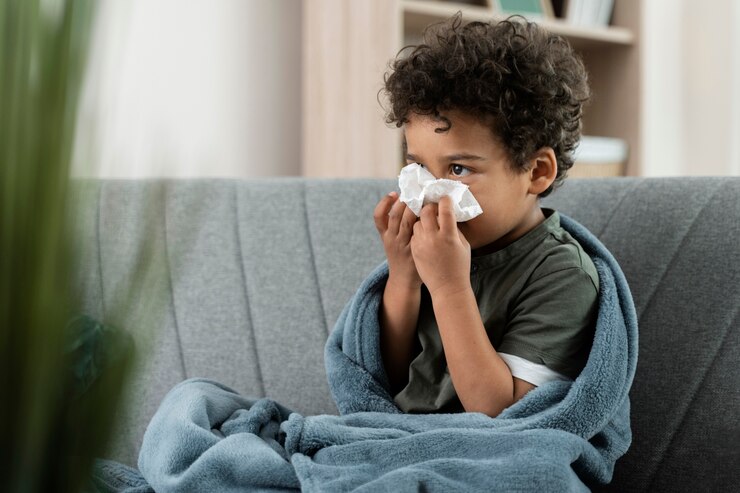Children’s chronic sickness most often results from asthma. The number of children affected in the US is around 7.5 million. Children are becoming more likely to have the illness. Furthermore, it is a primary reason for children missing school and parents missing work.
Why Does Asthma Affect More Kids Now?
According to researchers, and pediatricians, asthma in children is becoming increasingly common among youngsters, who suspect several reasons. These elements consist of:
- Increased exposure to allergens such as secondhand smoke, dust, and air pollution.
- Insufficient exposure to childhood diseases strengthens their defenses.
- Reduced breastfeeding rates deprive infants of vital nutrients for their immune systems.
Early Childhood Asthma Symptoms and Signs
Asthma symptoms vary among youngsters. Between episodes, a youngster may even have distinct symptoms. Asthma in children manifests as the following symptoms:
- An unresolved cough, which can be the sole sign
- Frequent episodes of coughing, particularly at night, in cold weather, when playing or exercising, or while laughing or sobbing
- a viral infection-related cough that grows worse
- less energy while playing and pausing to refuel when engaging in activities
- Staying away from social events and sports
- Coughing or breathing issues keeping you up at night
- quick breathing
- chest pain or tightness
- A whistling sound made during inhalation or exhalation
- Withdrawals made in a seesaw motion within their chest
- breathing difficulty
- rigid muscles of the chest and neck
- Feeling worn out or feeble
- Having difficulty eating or (in babies) grunting during the feeding
Why Does Asthma Develop In Children?
Though its precise etiology is unknown, asthma often strikes during a child’s formative years when their immune systems are still maturing. Various circumstances may impact the development of your child’s lungs and immune system. These consist of:
- Genetics: A family’s biological history, such as having an asthmatic parent.
- Allergens: Items in your child’s surroundings that irritate, such as cigarette smoke or dust.
- Childhood-onset viral infections: respiratory diseases, such as the common cold, that impact breathing.
The Diagnosis
Especially when a kid is exceptionally young, diagnosing them might be difficult. Little ones may be unable to finish the airflow test, which involves forcefully blowing into a tube, once they are at least preschool age. Furthermore, babies and toddlers are unable to express their emotions. Knowing asthma symptoms in children is thus crucial for parents, other family members, and caregivers.
If your kid has allergies that might aggravate asthma symptoms, your allergist may do blood or skin tests to determine the condition. Any age is appropriate for taking these examinations. Depending on your asthma’s severity, your allergist could also recommend one or more drugs.
Kids with asthma must get the proper care. Together, you and your kid may develop an action plan that will help your child gain long-term control over their allergies. Your kid may breathe easier, sleep through the night, and not miss daycare or school if they get the proper care. Older individuals and children may use lung function tests to assess the condition of their airways. Typically, a newborn cannot be used for this examination. Since a newborn cannot articulate symptoms, the doctor must examine the patient and review the history. Exams are often performed when your infant exhibits symptoms like coughing or wheezing. Giving your doctor your infant’s complete medical history is also crucial. Inform them of any breathing-related patterns you’ve seen in your symptoms, such as variations in response to exercise, rest, or various times of the day.
Your physician may want to see how your kid reacts to asthma medication to alleviate breathing difficulties if they believe your infant has asthma. After taking the medicine, if breathing becomes more accessible, it will assist in verifying the diagnosis of asthma. This may be a pulmonologist or pediatric allergist. However, as previously said, diagnosing asthma in a very young kid may be challenging.
When Should One See A Physician?
Get medical help immediately if your kid ever has trouble breathing or notices a change in their lips or face color. An acute episode of asthma may need medical attention.
Conclusion
Airway sensitivity is a lifelong condition for the affected individual. Asthma symptoms in around half of children with the condition noticeably go down when they reach adolescence. Thus, they overcome asthma in infancy.
However, asthma attacks from childhood may resurface. It is estimated that over 50% of children who seem to outgrow their asthma may have relapses in their 30s or 40s. Regretfully, it is impossible to foresee which individuals’ symptoms will subside throughout puberty and which may resurface later. Contact with Dr Sanjay, one of the most trusted pediatrician in Indore for more details.
Take Our Asthma Consultation
If your child is showing potential asthma symptoms like wheezing, chronic cough, or trouble breathing, it’s important to get an accurate diagnosis. Take consultation with our expert pediatrician to understand the situation better.





